- Home
- Diana Wynne Jones
Power of Three Page 6
Power of Three Read online
Page 6
For a time, there was desperate confusion. The Garholters had to leave their supper unfinished and find food, beds and medicine for the fugitives. And, as Kasta kept screaming that the Dorig had chased them the whole length of the old road, the Garholt sheep had to be got inside and the doors locked as quickly as possible. Gair found himself with Brad, both of them yawning till their ears cracked, guarding Ayna and the other girls, who were running about by Moonlight, shrieking the words to the sheep, which had scattered for the night nearly as far as the old road itself. They were relieved but puzzled not to see a single Dorig.
“Just as well,” said Brad. “I think I’d snore in their faces. What do you think happened?”
Gair wanted to know that, too, but he had to wait until the sheep were in, the doors locked, watch posted and the fugitives all settled in somewhere. Orban, Kasta and Ondo were, of course, settled in Gest’s house. Ayna, Gair and Ceri all gathered to watch Orban, with his wounds now bathed and bandaged, drink mug after mug of beer and explain what had happened. The long and short of it was that the Dorig had driven them from Otmound. That afternoon, the wells of Otmound had begun to overflow. While the Garholt hunt had been peacefully making its way home, Og’s people had been struggling to hold back a flood which no words would stem. The water ran from the wells, filled the mound and went on rising. By Sundown, the flood had reached the rooftops and everyone was forced to go outside. And outside, the Dorig were waiting.
“Crafty swine!” said Orban. “It was just like smoking out bees. They hid in the Haunted Mound and waited for us to come out.”
Orban and Og rallied those who could fight and attacked the Dorig, while the rest got away with their possessions. The fight had gone very badly. Og was killed. Orban had been forced to run for it with the rest of the fighting men, and the Dorig had pursued them. But the Dorig had not been anxious to go beyond the thorn trees along the first Giant road—Kasta, as usual, had overstated the case—and had turned back to Otmound. Orban had caught up with the rest and they had come on to Garholt as fast as they could.
“And you’d better watch that they don’t try that trick with the wells here,” Orban said, passing his mug to Miri for more beer.
“They can’t,” Gest said confidently. “All our wells are protected.” He pointed to the nearest, with its rounded stone hood and the twig-shaped writing on the stonework, which was the indoor equivalent of a thorn tree.
“I hope you’re right,” Orban said glumly.
Gair looked from his uncle’s weary face to the tears running down his mother’s. In a shocked, distant way, he knew there had been a terrible disaster. War, he thought. But it did not feel like that. He could not imagine Otmound as an underground lake or think of more than one Dorig at a time. As for Og, it was a shame, but to Gair he was a fussy old grandfather whom Gair had not known very well, or to tell the truth, liked very much. He looked at Ayna and Ceri’s sober faces and saw they felt the same. The important thing to all three was that here was Ondo back again after only two days, and the important question was when was he going?
Chapter
5
THAT NIGHT, ONDO HAD GAIR’S BED AGAIN AND he had to share with Ceri. Neither of them slept as well as they wanted. Gair woke feeling gloomy and apprehensive. He could hear the double flock of sheep bleating, the girls at the lookout posts calling to one another and Orban snoring. That in itself would have made anyone gloomy. But Gair felt uneasy too, in a way he could not explain. He forgot that he had intended to find out whether Ceri’s Thoughts made the air cold, and hung about with most of the rest of Garholt, waiting for news.
Gest had sent Banot over to Otmound in the early hours of the morning. He came back, red-eyed and fagged, soon after midday. Gair and Ceri wriggled near enough to hear what he said. It was not cheering. Banot had gone right up to Otmound to find water running out of it and the fields beyond it turning into a marsh. He could see it was still flooded.
“Then the Dorig saw me,” he said. “They came running out of the Haunted Mound—they seem to have made a camp there. And the captain—he was a long, tall one with a big opinion of himself—called out to know what I wanted.”
“You were lucky they didn’t kill you first and ask after,” Orban said. Gair was chiefly surprised that Banot and the Dorig could understand one another.
Banot winked and tapped his harp. “Dorig love music,” he said. “He waited till I’d finished playing, and then I asked what was going on. Told him I was making inquiries from Garholt. He didn’t say too much, but he told me they were going to live in Otmound in the future. They want to keep it for themselves.”
“Let them try!” Orban said angrily. “What then?”
“He went away for a bit and set a guard over me,” said Banot. “I began to wonder whether I would come back. But he must have gone to ask advice, I think, because he came back and said two things. One was that they’d got their revenge for that battle the year Gest did those tasks. The other was that their King was not going to attack Gest. May I get some sleep now? I’m worn out.”
“What did he mean by that?” Orban demanded.
“He didn’t say,” said Banot, who seemed to be falling asleep where he stood.
Gest smiled and signaled to Tille to get Banot away to bed. Then, still smiling, he turned to Orban. “This is a very sad business,” he said. “But don’t think you and your people have nowhere to go. You must make your home with us for as long as you need.”
Ceri gave a small moan of dismay. Gair crossed his fingers and prayed to the Sun that Orban would refuse. There must be an empty mound somewhere where the Otmounders could live.
But Orban laughed and clapped Gest on the shoulder. “Thanks. I was hoping you’d say that, Gest. You’re such a good fellow. We’ll fight the Dorig together, then. Drive the brutes out of Otmound and then out of the Moor!”
Gair wondered how his father could smile like that. He wondered how he was going to bear having Ondo living in Garholt. He felt miserable, and also indefinably uneasy, worse than he had done when he woke up that morning. He tried to explain to Adara how he felt.
“Don’t be stupid, Gair,” said Adara. “What else could Gest have said?”
The next few days were very difficult. As there seemed no danger of a Dorig attack, the Otmounders settled in, and the Garholters began to resent them exceedingly. The mound was uncomfortably crowded. New houses had to be built—and it was the Garholters who did the building, the Otmounders being exhausted after their tribulations. The sheep got mixed up. The Otmound smiths set up their forge where they were most in the way of the Garholt smithies, and the Otmound ladies put up their looms where they cut off the light from the Garholt weavers. Adara protested about it to Kasta. “Really?” said Kasta. “What a silly fuss about nothing!” And the looms stayed where they were, to Adara’s fury. Much the same happened over the forges when Gest protested to Orban.
Orban was most genial. Defeated and homeless he might be, but now Og was dead, Orban was Chief of the Otmounders. Otmound was the oldest mound on the Moor and, therefore, even without a mound, Orban was the senior Chief and more important than Gest. He blandly refused to move the forge. He insisted that his new house should be larger than Gest’s. And he wanted to lead out an army straightaway to kill as many Dorig as possible.
“Well, yes. But don’t let’s be too hasty about it,” Gest said. “People could say the Dorig are quite justified, after the way you drove them into the water by Islaw.”
“That was years ago!” said Orban. “This attack was quite unprovoked. You don’t expect me to sit here and let them get away with it, do you?”
“Of course not,” said Gest. “I just don’t want to be rash. We’re not prepared here. We ought to train the men.”
“There’s no training like real fighting,” Orban said. “If we go quickly, we can catch them napping.”
“I don’t think we dare go that quickly, not with this many people in Garholt,” Gest said. “We’d h
ave to provision the mound first. It’ll take at least one big hunt before the Feast of the Sun, and that’s only for meat.” This was true. There were now double the number of people in Garholt, and the Otmounders had not brought any food with them. The supplies from the last hunt were eaten in two days. If the Feast was to be held in anything like proper style, more meat had to be got and more drink brewed. “Suppose we wait until after the Feast of the Sun,” said Gest, “and then consider attacking.”
“We can send half out for food and the rest against the Dorig,” said Orban. “Dorig crumple if you hit them hard. It doesn’t take many men.”
“But that means leaving Garholt without men or provisions,” Gest pointed out. “If the Dorig attacked it, it would be completely defenseless.”
“But you’ve had their word they wouldn’t attack—and I like their nerve!” Orban said, growing exasperated. “What’s the matter with you, Gest?”
“Nothing,” said Gest. “I’d just prefer to wait at least till Autumn, when we’ve got food in—”
“Autumn! You expect me to sit and let the Dorig lord it in Otmound, and not do a thing about it till Autumn!” Orban bellowed.
“Now don’t think I don’t see your point of view—” Gest said.
“Nice of you! I don’t see yours at all,” said Orban.
The argument went on for days. Orban grew more and more exasperated. Gest remained wonderfully polite and steadily reasonable, and yet, as the days went by, it became clearer and clearer to Gair as he listened that his father had no intention of fighting the Dorig if he could avoid it. Gair could not understand it. Gest seemed so craven. He had given way to Orban about the forges, he had agreed to build Orban a very large house, but, on the one matter where it really seemed to Gair that Orban had right on his side, Gest politely refused to give in. This did not seem to be the Gest out of Miri’s stories at all. The gloomy, foreboding feeling Gair had had the first morning came back to him whenever he heard Orban and Gest arguing. It did not seem quite to be connected with the argument, but it troubled him more and more every time they argued. He confided it to Ayna in the end, since Adara was not prepared to listen to him.
“I’m not surprised,” said Ayna. “What with Father and Orban arguing, and Kasta saying catty things to Mother and boring everyone about Ondo, and Miri and Fandi looking daggers at one another, life’s unbearable. And it’s supposed to be forever! If Father doesn’t agree to fight the Dorig, it will be forever. Gair, ask me if they’re ever going, please!”
“Are the Otmounders going next month?” Gair asked.
The faraway look on Ayna’s face was mixed with surprise and relief. “Yes. Thank the Sun!”
“Back to Otmound?” said Gair eagerly.
Ayna’s face became even more surprised. “No. Far, far away. Oh, what a relief!”
Gair was as relieved as Ayna. It made it easier to bear with Ondo. For Ondo, as soon as he had recovered from his fright, became more odious than ever. He dared not harm Ceri, and scorned Ayna as a mere girl, so all his dislike was now aimed at Gair. He wanted to revenge himself on Gair for Ceri’s Thought, so he opened hostilities by reminding Gair that he had no Gifts. But that cut both ways. Ondo took up a new line. He came swaggering up with Scodo and Pad to where Gair was mixing mortar for Orban’s new house.
“Kiss my hand, Gair,” he said. “Come on.”
“Whatever for?” said Gair.
“I’d have thought even an idiot like you would understand that,” said Ondo, at which Scodo and Pad sniggered heartily. “Because I’m going to be High Chief, of course. You might as well kiss my hand now and admit it.”
“Who says you’re going to be High Chief?” Gair said scornfully. “You couldn’t be High Caterpillar!”
“Don’t you call names!” said Scodo. “And he is. So.”
“Everyone says so,” said Pad. “Like Orban.”
“Orban’s not High Chief,” said Gair.
“He will be,” said Ondo. “You should listen to what everyone’s saying. They want to make my father High Chief because Gest is such a coward and daren’t fight the Dorig.”
“So kiss his hand,” said Scodo.
Since Gair had been wondering for the last three days if Gest was a coward, this was more than he could bear. He growled with rage, and he would have gone for all three—a very unequal combat, as Scodo and Pad were both older and taller than Ondo—had not Brad strolled up, meaningly swinging a spade. Ondo, Scodo and Pad at once strolled away, laughing.
“Cowards!” said Brad. “Look, Gair, if you don’t try and beat Ondo up, you’ll have this for the rest of your life. You get Ondo. I’ll see to the other two for you. All the Garholters are on your side.”
Gair went back to his mortar, mixing it with stabs and punches, pretending it was Ondo. He knew Brad was right. Just let Ondo do one more thing—!
An hour later, he looked up to see Ondo, Scodo and Pad playing knucklebones up on his windowsill. It was deliberate. Ondo knew as well as anyone that the windowsill was Gair’s. Gair stood up, so angry that everything in Garholt was blurred and faint except for those three figures on the sill. He did not see the way all the Garholters, old and young, were watching eagerly, ready for a general fight once Gair attacked Ondo.
Adara did see, and she hurried to prevent it. “Gair, can you help me fold these blankets?” Gair looked at her, muddled and fuzzy-eyed with rage. “But you’d better wash your hands before you do,” Adara added. Without thinking, Gair went to the nearest bucket and put his hands in it. As soon as he touched the water, it dawned on him how she had tricked him.
“You made me wash my hands of him! It’s not fair!”
“I know. I’m sorry,” said Adara. “But if you fight Ondo, we’ll have both peoples taking sides, and it could be serious. He’ll leave you alone when he sees you won’t play. Promise me you won’t fight him.”
Sulkily, Gair promised. And, having promised, he felt he was forced to keep his promise, much to everyone’s disappointment. He ground his teeth and tried not to look at Ondo sitting smugly on his windowsill for the rest of the day. Gest saw Ondo, too. He might disapprove of Gair sitting there, but, like everyone else, he still thought of it as Gair’s windowsill.
“What the Ban does Gair mean by letting that little beast sit there?” he demanded of Adara. Adara explained what had happened. “I see,” Gest said curtly. He had just come from a long, long argument with Orban over the size of his new house and, though he had managed to keep his temper, he was so annoyed with Orban that he could not help thinking Gair was very poor-spirited not even hitting Ondo once. It did nothing to help any understanding between them.
The next day, Gair got to the windowsill first. It meant leaving his share of the building, but few Garholters blamed him. Gair did not feel at all triumphant. He sat with his knees under his chin, moodily looking out at the flat, deep green of the Moor, nagged at by the unhappy, uneasy feeling he kept having, and fairly sure that Brad and Gest, and probably everyone else, thought he was being a coward over Ondo. He thought he was being a coward himself. But, having made that promise, he did not know what to do. He had almost reached the point where he thought Ondo was right to hate him when he looked round to find Ondo, Scodo and Pad crowded onto the windowsill, too. While Gair was looking out at the Moor, they had quietly climbed up beside him.
Ondo grinned exultantly. Yesterday had convinced him Gair was easily crushed. “Get down,” he said. “We want to be here.”
Gair pushed on his heels and levered his back up the side of the window until he was standing up. He felt defeated. He knew that if he let Ondo get away with this, he would be giving in. But he had promised Adara not to fight. Dimly, down inside the mound, he could see people stopping whatever they were doing and turning to see what would happen on the windowsill. It looked as if he was going to make this a public humiliation for Garholt. All he could think of to say was, “This is my place—and I didn’t ask you up.”
“I don’t need
your permission,” said Ondo. “Down.”
“Gair’s scared,” said Scodo to Pad.
“Like Gest—he talks big and acts little,” said Pad to Scodo.
As before, the suggestion that Gest was a coward was too near Gair’s own fears for him to take quietly. “What do you mean by that?” he said.
All three laughed. “Everyone in Otmound knows what a cheat Gest is,” said Ondo. “He never did any of those tasks Og set him. He was too scared. So he cheated. Ask your mother, if you like. She told him the answers to all the riddles.”
“And of course he was too scared to kill a Dorig,” said Scodo. “So he went and swore friendship with one so that he could get its collar. Ask him where his own collar went, if you don’t believe us.”
“And you know how they say he moved the stone?” asked Pad.
“No. How?” said Gair. Each thing they said made him more blindly angry. He could hardly see them by this time. For he knew they were speaking the truth. It all fitted in. He knew Gest could not answer riddles, and he had always wondered why Gest had come home without his collar. “How did he move the stone?”
Ondo sniggered. “He didn’t. He got a Giant to move it for him, of course!”
Gair forgot his promise and went for Ondo. Scodo and Pad stood in his way, but he was so angry he hardly noticed them. His shoulder hit Scodo and his elbow caught Pad, and the two of them vanished. Gair heard both of them yell, below somewhere, and a furious buzzing from the bees, but he was too intent on catching Ondo to bother about them. Ondo, finding nothing between him and the raging Gair, did his best to climb back among the looms before Gair could reach him. Gair got to him when his head was still above the sill and seized hold of his gold collar. “Mother!” shrieked Ondo. There were screams from Kasta, beyond the looms, and screams to Gair, from the looms themselves, to baste Ondo. Gair hardly heard them. With the strength that only blind rage gives, he heaved the large, solid Ondo back onto the sill again, swung him round by his collar and hurled him after Scodo and Pad. “Mother!” roared Ondo.

 Fire and Hemlock
Fire and Hemlock Reflections: On the Magic of Writing
Reflections: On the Magic of Writing The Game
The Game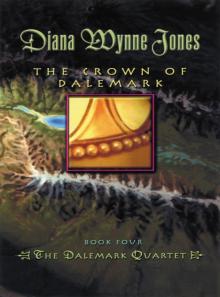 The Crown of Dalemark
The Crown of Dalemark Deep Secret
Deep Secret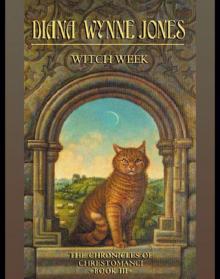 Witch Week
Witch Week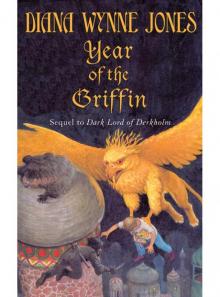 Year of the Griffin
Year of the Griffin Wild Robert
Wild Robert Earwig and the Witch
Earwig and the Witch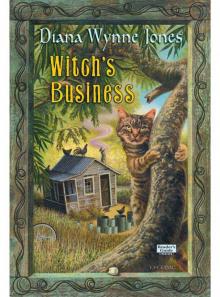 Witch's Business
Witch's Business Dogsbody
Dogsbody Caribbean Cruising
Caribbean Cruising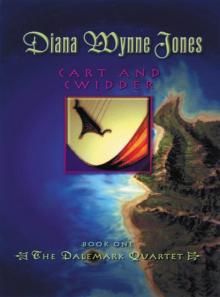 Cart and Cwidder
Cart and Cwidder Conrad's Fate
Conrad's Fate Howl's Moving Castle
Howl's Moving Castle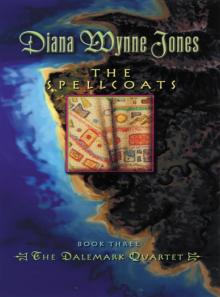 The Spellcoats
The Spellcoats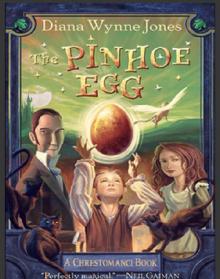 The Pinhoe Egg
The Pinhoe Egg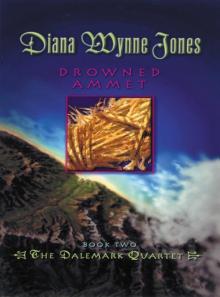 Drowned Ammet
Drowned Ammet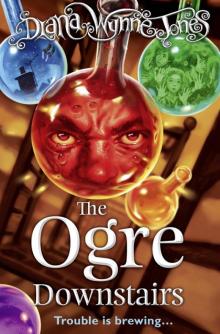 The Ogre Downstairs
The Ogre Downstairs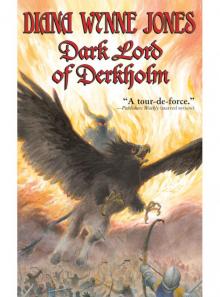 Dark Lord of Derkholm
Dark Lord of Derkholm Castle in the Air
Castle in the Air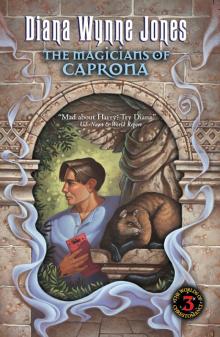 The Magicians of Caprona
The Magicians of Caprona A Tale of Time City
A Tale of Time City The Lives of Christopher Chant
The Lives of Christopher Chant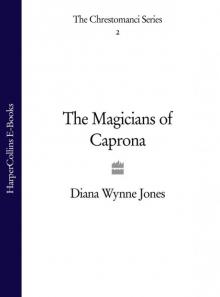 The Magicians of Caprona (UK)
The Magicians of Caprona (UK)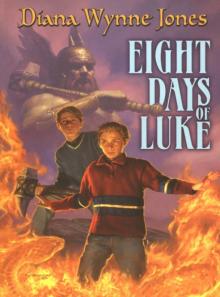 Eight Days of Luke
Eight Days of Luke Conrad's Fate (UK)
Conrad's Fate (UK) A Sudden Wild Magic
A Sudden Wild Magic Mixed Magics (UK)
Mixed Magics (UK)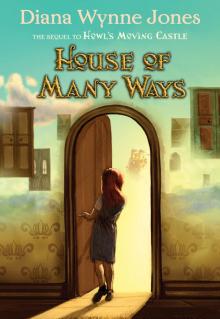 House of Many Ways
House of Many Ways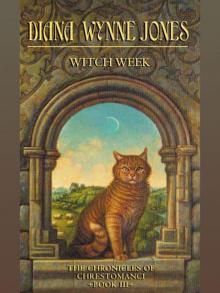 Witch Week (UK)
Witch Week (UK) The Homeward Bounders
The Homeward Bounders The Merlin Conspiracy
The Merlin Conspiracy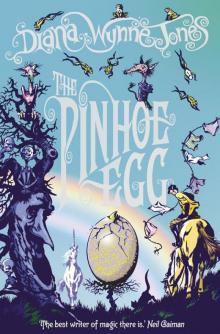 The Pinhoe Egg (UK)
The Pinhoe Egg (UK)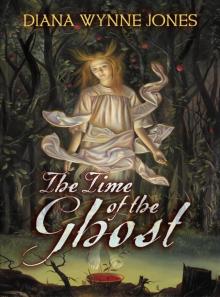 The Time of the Ghost
The Time of the Ghost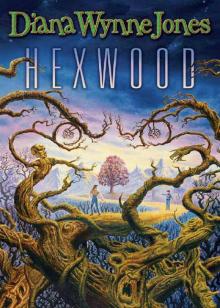 Hexwood
Hexwood Enchanted Glass
Enchanted Glass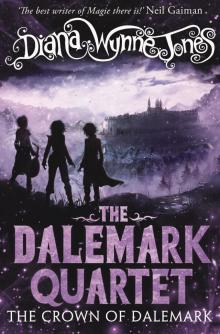 The Crown of Dalemark (UK)
The Crown of Dalemark (UK)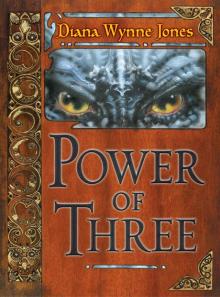 Power of Three
Power of Three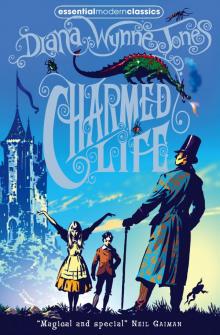 Charmed Life (UK)
Charmed Life (UK)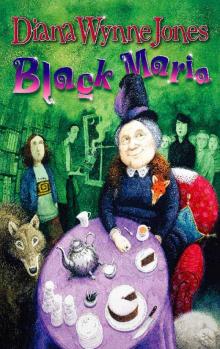 Black Maria
Black Maria The Islands of Chaldea
The Islands of Chaldea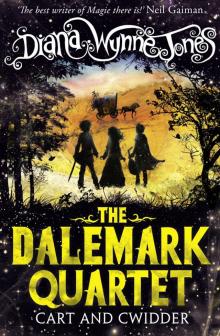 Cart and Cwidder (UK)
Cart and Cwidder (UK) Drowned Ammet (UK)
Drowned Ammet (UK) Charmed Life
Charmed Life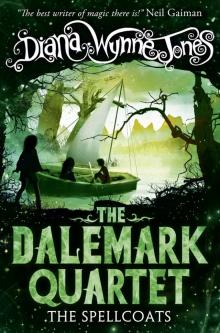 The Spellcoats (UK)
The Spellcoats (UK)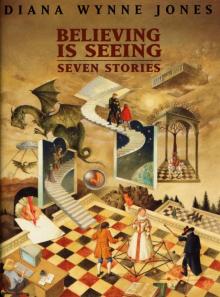 Believing Is Seeing
Believing Is Seeing Samantha's Diary
Samantha's Diary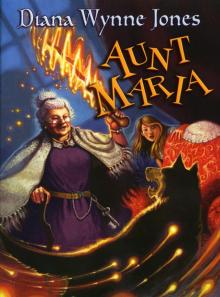 Aunt Maria
Aunt Maria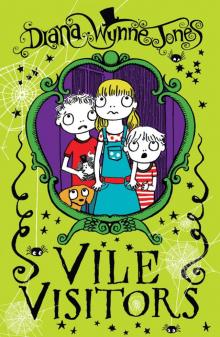 Vile Visitors
Vile Visitors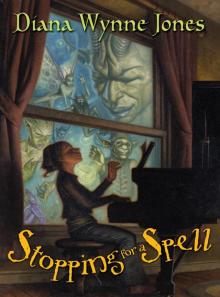 Stopping for a Spell
Stopping for a Spell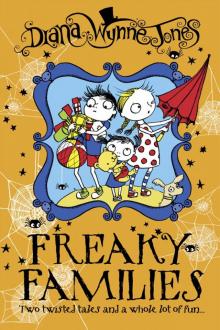 Freaky Families
Freaky Families Unexpected Magic
Unexpected Magic Reflections
Reflections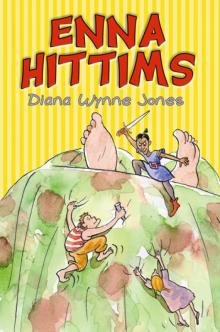 Enna Hittms
Enna Hittms Mixed Magics: Four Tales of Chrestomanci
Mixed Magics: Four Tales of Chrestomanci